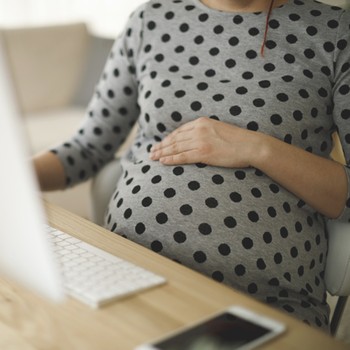Everything You Need To Know About Maternity Leave
It may sound obvious, but what are the fundamental rules to maternity leave.
It’s a period of time you can have off work when you’ve given birth to a child. You have ordinary maternity leave which is the first six months, and then additional which is the second six months.
Can partners of a child split the time they take off equally in the UK?
You have maternity leave, paternity leave and shared parental leave. Maternity is leave the mother is entitled to and they get a year off. Paternity is just two weeks, to be agreed by the employer. Leave has to be taken in whole weeks, so they could take one week at the start and one week further down. Shared parental leave is the opportunity for parents to split the mother’s maternity leave. When you have a baby, you have a compulsory two weeks off for maternity leave - which doesn’t seem long at all - but I’m sure there are circumstances where people just want or need to go back to work. So after two weeks, in theory, under the shared parental leave regulations, the father could take the rest of the year off. He’s entitled to apply to do that and will have certain protections. But the rule is, he has to have been employed for six months first, whereas for a woman going on maternity leave, it’s a day-one right. You might not be able to get pay from day one, but you’re entitled to the leave itself, so you could take a year off and your job still be there at the end.
How do you qualify for maternity leave?
Statutory maternity leave is available to all employees regardless of length of service, but there can be slight differences in the amount of leave you get and the pay you get.
When do you need notify your employer that you are pregnant?
You don’t have to notify them until the 15th week before your expected due date, so quite late – around the 24-week mark of your pregnancy.
When can you start your maternity leave?
You can’t start it until the 11th week before the due date. So effectively, you could have 11 weeks off before the due date. This obviously changes how much you get after the baby’s born - if you take it as early as 11 weeks before, you’re obviously eating into any time after you’ve had the baby.
What pay are you entitled to during maternity leave?
You get six weeks at 90% of your salary, and then you get £145.18, or 90% of your average weekly earnings –whichever is the lowest – after that. In April this year, it goes up to £148.68. You can only get this for 39 weeks, so if you take a year off, there will be around 12 weeks where you won’t receive any pay.
What’s the maximum amount of time you can take?
One year. In theory, you could agree a longer time with your employer. But with regards to your rights, the maximum time is a year.
Does your employer need to keep you updated on what’s happening in the business or with your role?
Yes, they should make reasonable contact with you. Before you leave, they should discuss with you how best to do that, whether you’d be happy to receive emails or post with updates, but they should certainly let you know about any promotion opportunities or job vacancies.
Are there any circumstances where you would need to work for your employer during your maternity leave?
No, not if you don’t want to. You can have up to ten ‘keeping in touch’ days during maternity leave, which you could use for training or to familiarise yourself with new systems, that kind of thing. You get paid a daily rate, and it won’t affect your entitlement for statutory maternity pay. However, you’re not obliged to use them.
What maternity rights do freelance or self-employed workers receive?
Unfortunately, there aren’t many. Maternity leave itself is only available to employees, but they may be able to get a maternity allowance - which is a government benefit you can apply for - through the job centre to get extra income whilst you’re off.
Are you allowed to do self-employed or freelance work unrelated to your current employer while you are on maternity leave?
In theory, you can do that without it affecting your entitlement to the pay. But say you’ve already got a job with someone, but whilst on maternity a few opportunities arrive with someone else, you’ve got to be careful of the relationship between your actual employer, you might be in breach of your employment contract if you start working for somebody else whilst on maternity leave.
Will you job be secure until you want to return to work?
Yes. In terms of job security if you take off ordinary maternity leave (26 weeks), if you return, you’re entitled to the same job. But if you take the longer period (one year), the employer can, in certain circumstances, say it’s not reasonably practical for you to return to the same role and offer you a suitable alternative role. So you’re still entitled to a job, but it might be the job has changed slightly because of circumstances in the business. They can’t employ your maternity cover in your place – that’s pregnancy discrimination.
You’re also entitled to all your benefits, so for instance, any other bonus payments staff receive when you’re off, you should get that too. Also, holiday – whilst you’re on maternity leave, your holiday accrues. So if you get 25 days a year, that accrues, and you can bookend your maternity leave, or take it before you start back, or even roll it into the next year.
What happens to pension and student loan contributions during this time?
It depends on how your pensions work, but generally speaking people have an occupational pension, so employers pay a contribution and the employees pay a contribution. The employer’s contributions have to stay the same throughout, regardless of what money you’re getting. In terms of the employee contributions, it will generally match – because obviously your salary will go down slightly – the 5% of your maternity pay, rather than your full salary. This automatically returns to normal once you’re back at work.
Because student loans work as a percentage of how much money you’re earning that month, it reduces accordingly whilst you’re off. So, frustratingly for some people, because the payments will go down due to changes in your pay, effectively it’ll make paying it off much slower.
Can you be made redundant during maternity leave and what happens if you are?
You could, because things happen and things change, and situations may arise where they don’t need you anymore. But you do have additional rights on your maternity leave. As with any employee, you have the right to be offered a suitable alternative vacancy if there is one, but your rights are almost trumped when you’re on maternity, meaning if there is a suitable alternative vacancy then you should be offered that without being put into a competitive interview process with the rest of the staff – you should just get that position. Obviously, you might not want that position, but you have those extra rights. Its almost an example of positive discrimination, where someone on maternity leave gets treated more favourably. But if there isn’t a role you could, in theory, be made redundant.
What happens if you decide not to return? How much notice do you need to give?
It’s up to you. In terms of notice, if you want to terminate your employment you need to check what’s in your contract. But you have to think about your entitlement to statutory maternity pay – if you’re no longer employed, you may no longer be entitled to the maternity pay. Savvy employees will wait until they’ve done their maternity leave before handing in their notice. It’s not uncommon for people will do that. Maternity is a tricky time, so you need to be aware of your benefits and make the most of them.
And what if you want to come back to work earlier?
You just need to give your employer eight weeks’ notice. It doesn’t have to be in writing, but that is the most sensible way to do it. Obviously there will be employers that will take shorter notice, but what the law states eight weeks.
If you get pregnant whilst you’re on maternity leave, is that frowned upon? Can your company take action against you?
It’s probably privately frowned upon, but I think an employer would be silly to expressly say that! I think it happens all the time. They can’t take any action against you, but when it comes to entitlement to maternity pay, the employee needs to be careful to ensure they’re entitled to that pay again for the second child. Provided you return to work for three months between the two, then they will be entitled to statutory maternity pay as they were before. If it’s any less than that, it might be they’re not earning enough to receive the same level of maternity pay they received the first time. It depends on the timing – and how mad you are to have two in a row!
For more information, visit Shakespeare Martineau here.
DISCLAIMER: We endeavour to always credit the correct original source of every image we use. If you think a credit may be incorrect, please contact us at info@sheerluxe.com.




